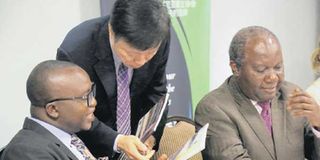Look beyond certificates: call

Deputy Minister in the Prime Minister's Office (Labour, Employment, Youth and the Disabled), Mr Anthony Mavunde (left) reads catalog book which he received from China Enterprise Confederation division director, Prof Michael Niu (center) after meeting that discussed employment and labour challenges facing Chinese companies which was organised by Association of Tanzania Employers (ATE) in Dar es Salaam yesterday. Right is ATE executive director, Dr Aggrey Mlimuka. PHOTO | SALIM SHAO
What you need to know:
- They called upon the government to consider changing the system in favour of one’s ability to do the job.
Dar es Salaam. The tendency of assessing people’s skills basing on their academic certificates is bad, members of the Chinese business community said in Dar es Salaam yesterday.
They called upon the government to consider changing the system in favour of one’s ability to do the job.
Speaking during a meeting with government officials in Dar es Salaam yesterday, the chief representative from Chinese embassy in Dar es Salaam, Mr Yuan Lin, said since the system is not applicable in his country, most of his countrymen and women fail to secure certificates and are thus turned down when they apply for work permits in Tanzania.
As a result, he said, highly qualified people from China, who have the relevant skills, fail to get work permits in Tanzania, forcing Chinese investors to pay massively as they go to other countries which have similar academic systems as Tanzania in search of people with the “papers”.
He asked the Government of Tanzania to emulate how things were being conducted at under the Engineers Registration Board (ERB) where one is only required to show his/her prowess in doing an engineering assignment before he/she is issued with relevant papers with which to secure work permits from the labour.
But in a quick rejoinder, the Deputy Minister of State in the Prime Minister’s Office (Policy, Parliamentary Affairs, Labour, Employment, Youth and the Disabled), Mr Anthony Mavunde, said the issue of certificates was not debatable.
“All investors will have to comply with Tanzanian laws and regulations when it comes to labour and employment issues,” he said.
He said the cost of doing business in Tanzania was riddled with high import duties, stringent laws involving employment of foreigners, long procedures associated with acquiring residence and working permits, poor transportation and unskilled local workers.
“The law requires us to employ only a limited number of foreigners. However, most of the locals we get are highly unskilled and inexperienced. This makes investors to use extra efforts and funds to train than producing….We take up to six months just to get a working permit. It is really distressing,” he noted.
The meeting, organized by the Association of Tanzania Employers (Ate) and attended by Chinese business community and other public officials related to employment and labour issues, sought to discuss critical issues facing the Chinese Businesses in relation to employment and labour laws.
It detailed on compliance to local labour laws, employment of workers, termination of employment, hours of work, leave, remuneration issues, work/resident permits issues, workers compensation, taxation issues for long standing solutions. In his remarks, Mr Mavunde said Tanzania will continue to maintain strong business relations with China, promising to address the challenges.
“Tanzania remains committed to working with Chinese investors as its investments generally come without strings attached. Unlike other wealthy nations, which tend to tie funding to social and political reforms, we like China’s policy of non-interference which is refreshing and seem beneficial” he noted.
He said it was basing on such a policy that China currently remains one of the top sources of investments in Tanzania, having invested into projects worth Sh15.82 trillion within six years.
He said the government has reduced the time spent on processing work permits from three months to 14 working days.
He said however that some residence and working permits were taking long to be issued because most of foreigners have no required documents.




